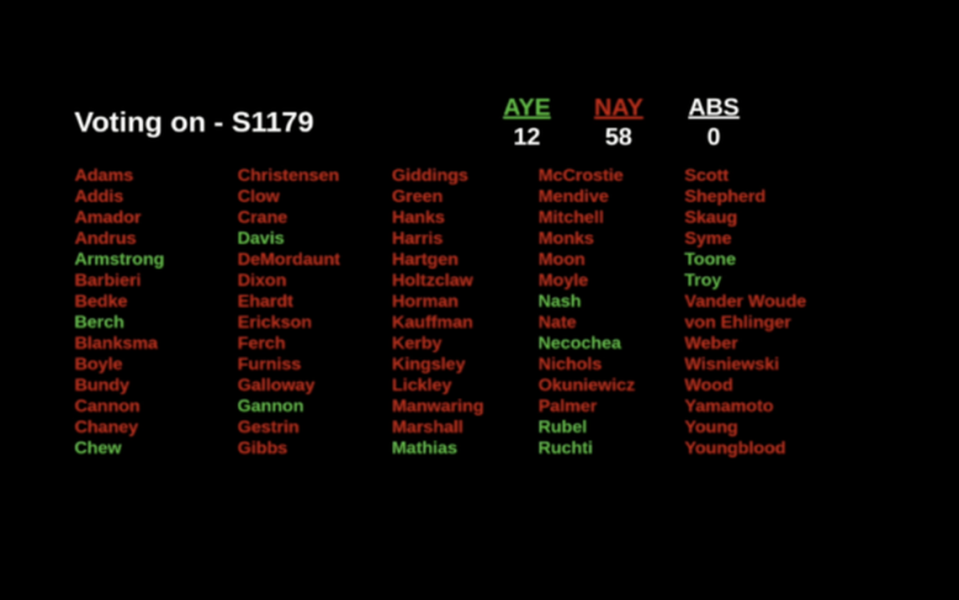Social justice. Critical race theory. Why Idaho House rejected higher-education budget
This story was originally published on IdahoEdNews.org on April 7.
The budgets of Idaho’s higher education institutions remain in limbo after the House shot down an effort to allocate $631.4 million to state colleges and universities.
The overwhelming 13-57 vote — after a freewheeling hour-long floor debate — marked the latest chapter in a brewing Statehouse showdown over social justice programs on Idaho campuses.
Senate Bill 1179 would have parceled out money from fees and tuition, and $315.2 million in general fund tax dollars. The bill would have cut $409,000 from Boise State University’s bottom line — shifting that funding to Lewis-Clark State College, amid Republican lawmakers’ concerns that Boise State is promoting “social justice ideology” activities and curriculum.
The bill passed the Senate last month, even though some senators said the budget didn’t send a strong enough message to higher education leaders. And on Wednesday, some House conservatives vowed not to pass the budget until more cuts are made.
“We have seen in Idaho … problems with social justice and critical race theory,” said Rep. Ron Nate, R-Rexburg. “And so as we reject this budget today and send it back to (the Joint-Finance Appropriations Committee), we ought to give that kind of direction to JFAC that we expect a budget back with a significant cut that at least sends the message — and also gives the universities the opportunity to demonstrate that they’re willing to make the changes needed to make us feel comfortable about funding higher education that matches Idaho values again.”
Nate, a JFAC member, suggested cutting around $4 million from the budget.
House Republicans echoed their Senate colleagues, mostly zeroing in on Boise State’s approach to social justice and critical race theory. However, a couple of lawmakers briefly voiced concerns about programs at the University of Idaho and Lewis-Clark.
At least two lawmakers renewed calls for the budgets of the state’s four public colleges and universities to be broken out into separate bills, an idea JFAC rejected earlier this session.
Some argued that perceived problems could be remedied with policy changes from the Legislature or by college administrators. Others, all Democrats, stressed the value of emphasizing social justice in education.
“For the sake of the people of Idaho, the students of Idaho, the parents of Idaho and the businesses of Idaho: We do them a tremendous disservice by not funding the jewels of our state, which are our universities,” said Assistant Minority Leader Ilana Rubel, D-Boise.

The budget will now start over in JFAC — at the urging of the bill’s sponsor.
Rep. Paul Amador, R-Coeur d’Alene, began the debate with an unusual request. As the House expedited debate on the budget, he asked the House to reject it, and send budget-writers back to the drawing board so that students won’t have to “bear the brunt” of tuition increases.
“I think we recognize now that this probably isn’t the budget that will meet those requirements and needs,” he said, “to help our students move forward in the best way possible.”
Amador asked for a new budget that “would be best for colleges and universities and our students in the state of Idaho.”
The Legislature must pass the higher education budget before the session ends, and the clock is ticking. Senate President Pro Tem Chuck Winder, R-Boise, hopes to finish the Legislature’s restarted session April 16, he said in a recent Idaho Education News podcast interview.
With Wednesday’s vote, the session may go longer.
▪ ▪ ▪
What is critical race theory?
According to the Encyclopedia Brittanica, critical race theory is an “intellectual movement and loosely organized framework of legal analysis based on the premise that race is not a natural, biologically grounded feature of physically distinct subgroups of human beings but a socially constructed (culturally invented) category that is used to oppress and exploit people of color. Critical race theorists hold that the law and legal institutions in the United States are inherently racist insofar as they function to create and maintain social, economic, and political inequalities between whites and nonwhites, especially African Americans.” - Idaho Statesman

